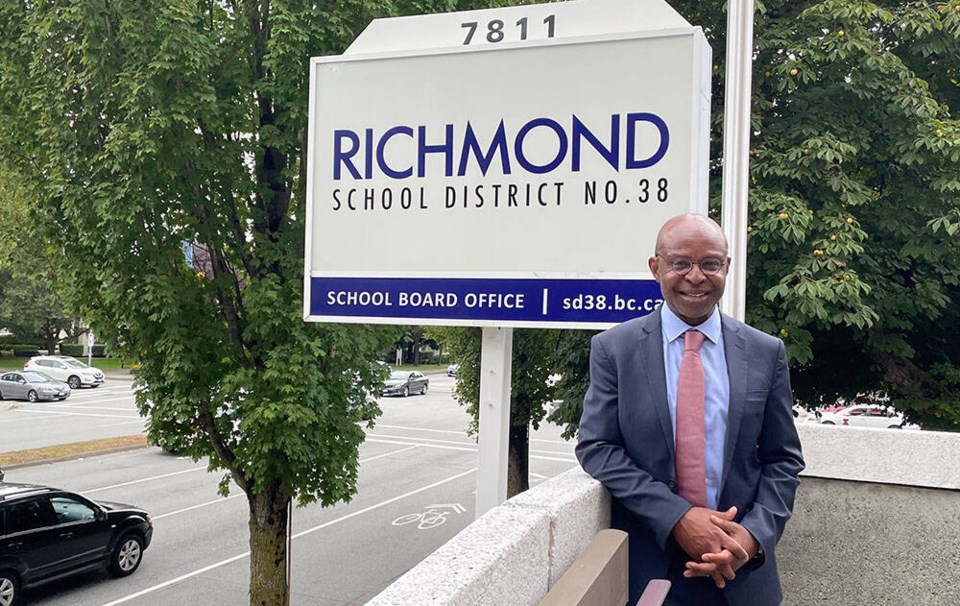The new superintendent of the Richmond School District, Chris Usih, has hit the ground running.
His goal is to visit every school in the district in the month of September, and this started the first week school was back.
And what he’s seen so far has impressed him – high academic success, high expectations from parents, but also a focus on personal well-being.
Already in these early days, Usih said he’s seen “rich programming” throughout the school district and a “commitment to excellence.”
But that doesn’t mean he will be resting on his laurels, rather he has been poring through data to identify what questions need to be asked to ensure every student is successful.
“I don’t think we’ll ever get to a place where we say we’re perfect,” he said.
SD38 ‘just the right size’
Usih’s first teaching job was with an Indigenous community in northern Manitoba, but he then moved on to the Toronto school district where he was a teacher and held various administrative roles before moving west.
Before coming to Richmond, Usih was the chief superintendent of schools in Calgary for about five years.
Coming from large school districts – with more than 560 public schools in Toronto and 251 in Calgary – Usih called the Richmond School District “just the right size.”
“Just that sense of community is what’s exciting,” Usih said. “Everyone that I’ve met so far has a real commitment and passion for the work that they do.”
The weekend before he sat down with the Richmond News, Usih had been looking through school district data.
He hopes to continue building on the strong programs he’s seen so far, using evidence-based information and data to ensure “every student has the best chance of success.”
“If we have the right data, we can ask the right questions,” he said. “If we don’t have the right data, then we’re just guessing.”
Academic success and personal well-being equally important
How one defines success, however, can differ and he sees two pathways: academic success and personal well-being.
Traditionally, success was measured in the former, but increasingly educators are focusing on the latter as well.
“We want every graduate from Richmond to experience both,” he said.
Besides, how students experience their time in school is just as important as what they learn.
Usih said his former students would come back to him, not remembering a lesson in calculus, rather remembering how he did something different on Fridays as a sendoff for the weekend.
After graduation, students talk about those things that contributed to their emotional well-being, things that brought them joy and the caring adults in the schools, Usih said.
“It never ceases to amaze me, like adults, students remember those inter-personal relationships – it’s what resonates with them many, many years after they’ve left us,” he added.
As for his personal philosophy, Usih believes education should be grounded in equity and collaboration.
The concept of equity, however, doesn’t mean every student gets the same thing, rather, every student gets what they need.
“Every student should have the best opportunities despite their personal circumstances,” he said.
A significant number of Richmond graduates go to post-secondary, Usih noted, and that’s the goal of the school system.
But this isn’t necessarily a four-year university degree, Usih said, rather post-secondary can be skilled trades training, a college program or an apprenticeship.
While there’s an identified skills gap in various sectors in B.C. and Canada, there will also be jobs in the future that aren’t even envisioned yet.
Therefore, teaching students “soft skills” like problem solving and collaboration are even more important today.
“We recognize we’re preparing students for this new space that we might not fully understand,” Usih said. “But what we know is it requires greater collaboration, greater problem-solving skills, and it requires us to work in different contexts in a way we’ve traditionally pictured a workplace to be.”
This conversation needs to happen with students and parents before they are approaching the end of high school, however, so they understand it’s possible to get a good job and earn good wages even on a non-degree pathway, he added.
Youth will face 'complex problems' in the future
While a grounding in the basics is still important, problem-solving and applying knowledge will be key for today’s youth to tackle the “complex problems” they’ll face in their lifetime, including changing technology and climate change.
Young people are “very bright and quite creative,” Usih said, and they have problem-solving potential because they don’t necessarily think linearly.
In fact, just on the second day of school, Usih visited Burnett secondary where students were debating current issues. Instead of being told to read something and write a test on it, they had to read and come to school ready to take a position and debate it.
Even if they’re using the Internet or artificial intelligence for research, when they have to argue their position, they are using data to back it up, Usih explained.
“It’s not a concern that they’re using technology to drive their argument, now they’ve taken a position and they’re going to substantiate their position on evidence that exists,” he added.
There is, however, still a need for basic knowledge, but it needs to be combined with critical thinking to “elevate” the information and have a “serious conversation” about it.
“It’s not this or this, it’s both,” Usih said.



